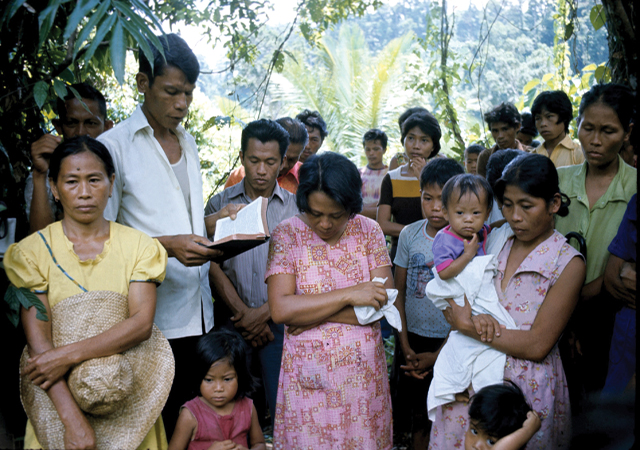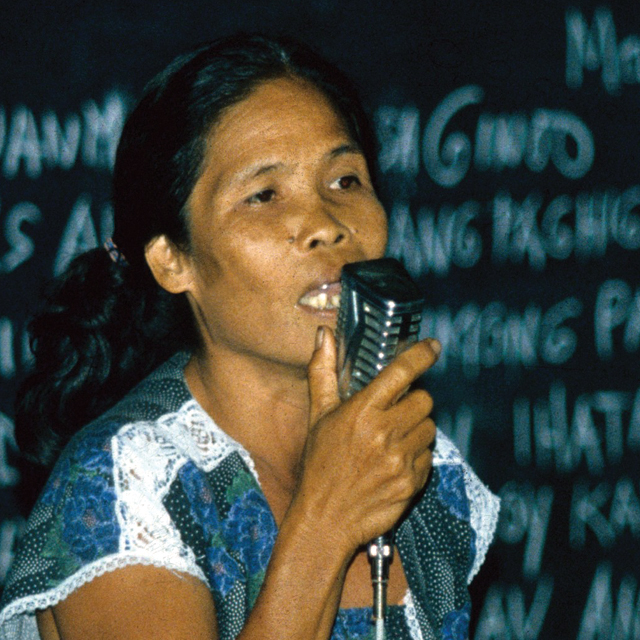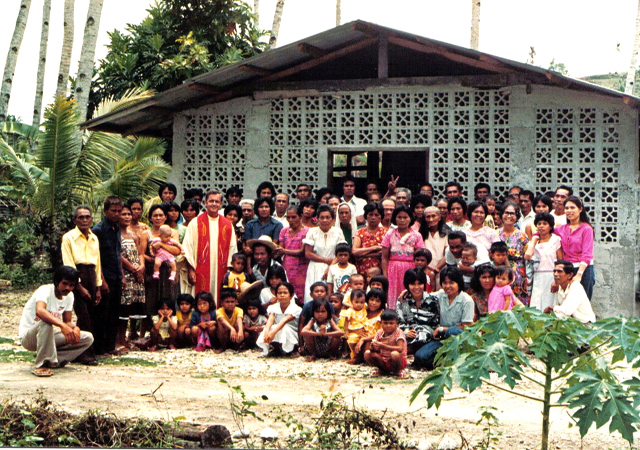People of faith and courage
Experiencing God's love firsthand through the people of the Philippines
By Fr. Mike Traher, S.F.M.
September/October 2011
Return to Table of Contents
Print Article
Missionaries go out into the world to be signs and witnesses of God’s love. At the same time, we find ourselves transformed by the people who also witness God’s love to us. While serving as a missionary priest on the island of Southern Leyte, Philippines, I experienced firsthand God’s love being revealed in a variety of ways, especially through people and events. The following stories speak about the love and faith of the Christian communities with whom I worked in the parish of Saints Peter and Paul.
Siyong
Casimiro Animas was one of the finest Christian leaders in our area of the Pacific towns of Southern Leyte. Simply known as Siyong, he lived with his family in a village in the mountains between my own parish area and that of our neighbouring St. Bernard’s parish. It was the time of Martial Law throughout the Philippines and both the army and the anti-government rebels were vying for control in the mountains above us.
A natural leader, Siyong eagerly absorbed the leadership seminars and training in scriptural refection and in leading a community prayer service on Sundays when there was no priest to celebrate Mass. He also had a won-derful innate wisdom which he used to address social issues that affected his community, like forming a small cooperative among his fellow farmers to help them get out of debt.
When government soldiers massacred a family in the mountains, Siyong gathered a group of his neighbours and travelled around the area from town to town, even going to a radio station on the central island of Cebu, to demand an investigation. His profound witness of persevering faith, hope and courage was humbling to us as missionaries because he literally put his life on the line for the sake of truth and justice in the name of Christ.
Siyong’s courageous stance for justice drew attention. Politically at that time, in the early 1980s, both the military and the rebels wanted his support. He refused both of them saying that he was already committed to serving Christ and his faith community. For his lack of cooperation, Siyong was imprisoned by the military and tortured for any information they thought he had about the rebels.
By the grace of God he was helped to get out of military detention through the intervention of his sister and the bishop of the diocese. The response of the military was to immediately order him to leave the area. He spent three years in exile in the south of the country, in Mindanao. When he returned home I met up with him and to my surprise he said, “I am so thankful to God who used the military to spare my life.” He learned that if he had stayed home instead of going into exile, he would have been killed by the rebels.
Siyong witnessed to me the power of persevering Christian faith and courage that leads to seeking justice for one’s neighbour in the face of great sacrifices. His secret was living daily with a spirit of thanksgiving to God for life, family and the love of God that sustained him.
 Siyong leads the prayer for a murdered farmer during the oppressive years (1972 to 1981) of Martial Law in the Philippines.
Siyong leads the prayer for a murdered farmer during the oppressive years (1972 to 1981) of Martial Law in the Philippines.
Edith
When I first met Edith Feji, a mother of eight children, she was seriously ill with TB. After anointing her, I asked our companions, the Sisters of Our Lady’s Missionaries, to visit Edith and see what could be done to help her. With proper medication and rest she got better. In thanksgiving to God for being restored to health, she asked to join one of our Core leadership groups that met each week to share faith and scripture. They were preparing to become Christian leaders in their village communities, each according to their individual gifts for service.
Edith chose to become a catechist for young children in a public school two kilometres from her home. Each week she would walk the dusty road down to the village of Esperanza. Edith had only a few years of elementary school herself and could barely read and write. She often got her own children to help her write out the lessons. However, one thing she had in abundance was her love for the school children and her desire to teach them about God’s love. Whenever “Mam Edith” made a mistake, the children, instead of laughing, would respectfully correct her words on the chalkboard. They felt deeply her motherly love for them and connected it intuitively with God’s love.
Sometimes the regular teachers would ask Edith to supervise their class while they went to do errands and Edith usually accepted. Yet she always felt embarrassed because she didn’t have “real shoes like the teachers”; hers were only sinilas (flip flops).
One day while walking home along the path from school, Edith saw in the distance a well-off farmer pounding on her neighbours’ door. The farmer was loudly demanding that the family pay back the rice he had loaned them with interest. Edith knew they couldn’t pay because they had suffered a very poor harvest. As she got closer, the wealthy farmer stepped onto the path heading in Edith’s direction.
“Suddenly something came over me,” she said, recalling the moment, “and I knew I had to speak to this man.” As the farmer drew close, Edith raised up her small stature and said in defense of her neighbour: “Who do you think you are, taking food out of the mouths of the poor? You should be ashamed. Don’t you know that God is judging you?”
Shocked by this little woman confronting him, the man stopped in front of her. Then utterly embarrassed he lowered his head, walked around her and continued on his way. As soon as Edith reached her own doorstep and put a foot on the stairs, she began to shake all over, feeling suddenly very weak. “Only then did I realize what I had done!” she said. “It had to be the Holy Spirit urging me and giving me the courage to stand up for my neighbour.”As I listened to Edith tell her story to the core group, we all came to realize that God can use any one of us to proclaim the truth of the Gospel if our hearts are open to his Spirit.
The community of San Pablo
In my final year in the parish I experienced something special with a little community of people on the island of San Pablo, about 20 minutes offshore from Hinunangan. Following several years of going to the island by boat each Saturday offering Christian leadership seminars, scriptural reflections and basic catechesis, something special happened.
Eugenio, an elder in the Catholic community came to me one day and shyly told me that he and his wife Catherine had never had their marriage blessed by the Church. Not only that, but there were several other couples who were in the same situation. They had also persuaded the barrio (neighbourhood) captain and his wife to come back to their Catholic faith and have their marriage blessed as well.
It was such a profound moment for me because everyone was becoming transparent and trusting in the goodness of God. They wanted to be fully reconciled to God and united with each other as a community through their renewed faith.
A final celebration of the Eucharist held on the island before my leaving the parish included a joint wedding ceremony in which five couples had their marriages blessed. When the liturgy finished, a deep joy radiated among the whole community as they proudly said to each other, “Now we are all together in Christ and we are finally complete as a community, as God wants of us.” On that day the reign of God revealed itself brilliantly among the people of San Pablo.
Siyong, Edith, the community of San Pablo, and countless others, by their lives and witness, affirm that the mission of Christ is about creating relationships with people and allowing the Spirit of God to transform us into communities of faith and trust, into people learning to live more fully in justice, peace and harmony.
Fr. Mike Traher is a member of Scarboro’s General Council and also the Society’s vocation director, accompanying those who are discerning a vocation as a missionary priest with Scarboro. He served in the Philippines from 1974 to 1984.
Return to Table of Contents
Print Article

